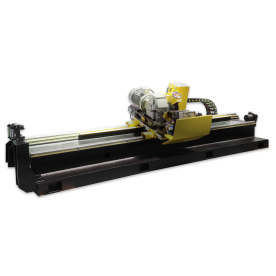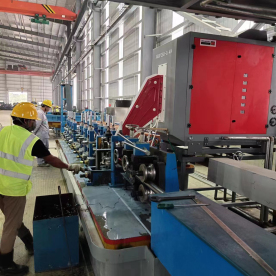In the ever-evolving landscape of metal fabrication, the demand for precision, efficiency, and speed has reached unprecedented levels. One of the standout innovations that address these needs is the High-Speed Flying Saw Machine. This advanced piece of machinery is set to revolutionize manufacturing processes across various industries by combining high-speed cutting capabilities with enhanced operational efficiency. As we delve into the intricacies of this technology, it becomes evident why the High-Speed Flying Saw Machine is an essential investment for manufacturers aiming to remain competitive in today’s market.
Understanding the High-Speed Flying Saw Machine

Revolutionizing Metal Fabrication: The Advantages of the High-Speed Flying Saw Machine in Modern Manufacturing Processes
The High-Speed Flying Saw Machine is designed to slice through metal and other materials at remarkable speeds while on-the-go, making it distinct from traditional saws that operate in a more fixed manner. Typically used in applications such as metal processing, steel fabrication, and even some wood cutting scenarios, this machine features a blade that moves with high velocity while simultaneously advancing the material being cut. This simultaneous movement allows for a continuous flow of production, reducing downtime typically associated with the stopping and starting motions of conventional saws.

Revolutionizing Metal Fabrication: The Advantages of the High-Speed Flying Saw Machine in Modern Manufacturing Processes
Key Features of the High-Speed Flying Saw Machine
1. **Speed and Efficiency**: One of the most significant advantages of the High-Speed Flying Saw Machine is its rapid cutting speed. Capable of reaching cutting rates of up to several meters per minute, the machine significantly reduces cycle times. This improvement means that manufacturers can increase output without compromising quality.
2. **Precision Cutting**: With advancements in technology, modern High-Speed Flying Saw Machines employ sophisticated motion control systems that provide high precision in cutting. This level of accuracy minimizes material waste and increases the quality of the end product.

Revolutionizing Metal Fabrication: The Advantages of the High-Speed Flying Saw Machine in Modern Manufacturing Processes
3. **Versatility**: The High-Speed Flying Saw Machine is not limited to a specific type of material. It can effectively cut various metals, including steel, aluminum, and brass, making it an invaluable tool in different manufacturing sectors from automotive to construction.
4. **Reduced Labor Costs**: The automation integrated into the High-Speed Flying Saw eliminates the need for excessive manual labor in cutting processes. Operators can oversee the machines and manage multiple tasks, thus optimizing workforce allocation and reducing labor costs.
5. **Enhanced Safety Features**: Modern machinery, including the High-Speed Flying Saw, incorporates numerous safety features designed to protect operators and reduce accidents in the workplace. These features may include automatic shutdown systems and protective coverings, thereby creating a safer working environment.
Impacts on Manufacturing
The implementation of the High-Speed Flying Saw Machine has profound implications for the metal fabrication industry. By improving speed and efficiency, manufacturers can meet growing demands while maintaining cost-effectiveness. In an era where just-in-time production is crucial, the ability to rapidly process materials is invaluable.
Furthermore, with the focus on sustainability and reducing waste, the precision of cuts that this machine offers plays a crucial role in minimizing scrap material. As industries face pressure to adhere to environmental regulations and expectations, the High-Speed Flying Saw Machine presents a solution that aligns with sustainable practices.
Conclusion
As we look to the future, the High-Speed Flying Saw Machine stands out as a transformative technology for metal fabrication and beyond. Its ability to deliver fast, accurate, and efficient cuts is unparalleled, making it a cornerstone in modern manufacturing. Manufacturers seeking to enhance productivity, reduce costs, and improve their competitive edge will find that investing in a High-Speed Flying Saw Machine is not just advantageous but essential. The evolving demands of industries worldwide necessitate innovation, and this advanced machinery embodies the solutions manufacturers need to thrive in a fast-paced, competitive landscape. By embracing such technologies, businesses can position themselves at the forefront of the manufacturing revolution, paving the way for a more efficient and sustainable future.High frequency welder for plastic



